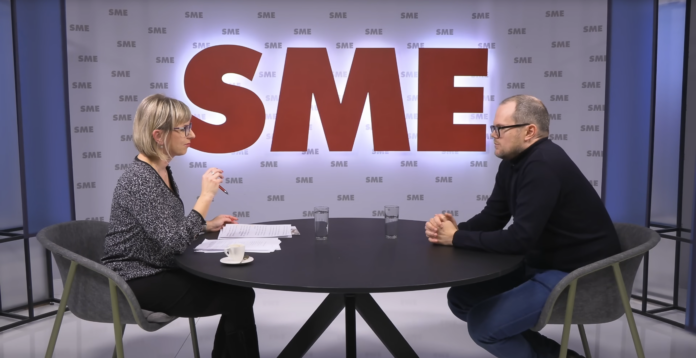Slovakia’s legal and judicial institutions are facing sharp criticism amid allegations of government interference and complicity within parts of the justice system in cases targeting former police anti-corruption investigators. These investigators, known for pursuing high-profile political corruption, are now defendants in prosecutions described by their attorney as a “blatant misuse of authority.” The charges, based on duplicated allegations and unsubstantiated evidence, have raised concerns of political retaliation rather than legitimate legal inquiry. Critics contend that these actions reflect an effort to discredit investigators who exposed systemic corruption, fuelling broader fears about the erosion of judicial independence and the weaponisation of legal mechanisms to serve political ends in Slovakia.
This article is based on an interview conducted by Jana Krescanko-Dibáková with attorney Peter Kubina on the Arena show, featured in the daily newspaper SME.
The legal battles surrounding police investigators Peter Dunčko and Matej Magula have brought sharp focus to Slovakia’s justice system, with accusations of political interference and procedural failings. Represented by attorney Peter Kubina, the two operatives were recently released from pre-trial detention after an appellate court unanimously ruled that the evidence presented by prosecutors was insufficient. This outcome underscores what Kubina described as the “absurdity” and “unsubstantiated nature” of the charges, framing them as politically motivated efforts to discredit whistle-blowers and undermine anti-corruption investigations.
The operatives, part of the so-called “Čurilovci,” are prominent for their anti-corruption work and their public stance against systemic wrongdoing. However, their outspokenness has made them targets of what Kubina considers retaliatory legal action. Magula is accused of obstructing justice during a 2021 operation already being litigated, in what Kubina described as “a textbook case of double jeopardy.” Meanwhile, Dunčko faces charges based on uncorroborated testimony from a single witness. Kubina suggested the timing of their arrests—shortly after the publication of Čurilovci, a book shedding light on their investigative work—was a deliberate attempt to silence dissenters. “It looks like a knee-jerk response to their public advocacy,” he stated, pointing to the rushed and reactionary nature of the charges.
Absurd Proceedings: Key Examples of Flawed Evidence
Kubina highlighted specific aspects of the proceedings that illustrate the weak and politically motivated nature of the cases:
1. Duplicated Charges Against Magula
Magula is being prosecuted for the same alleged actions that are already part of an ongoing trial. Slovak constitutional law explicitly prohibits double jeopardy, making these additional charges legally unsound. Kubina called this “not only legally untenable but also a blatant misuse of prosecutorial authority.”
2. Unsubstantiated Testimony Against Dunčko
Dunčko’s case relies on the testimony of a single witness, Peter Petrov, whose account is unsupported by other evidence. Although prosecutors claimed there was a second witness, this individual’s testimony failed to corroborate Petrov’s claims. The court dismissed the charges as resting on weak and unreliable evidence.
3. Use of Irrelevant Evidence
Prosecutors cited private communication records from chat groups as proof of collusion, but the court deemed these materials irrelevant. The chats lacked any direct link to the alleged crimes and appeared to serve more as a means of casting suspicion than presenting substantive evidence.
The cases of Dunčko and Magula have raised significant questions about the independence of Slovakia’s judiciary and the misuse of legal mechanisms for political purposes. For now, the investigators and their attorney remain resolute in exposing what they see as baseless charges, hoping that public and judicial scrutiny will reveal the truth.
Source: SME
Read more about anti-corruption police investigators targeted by the Fico government







